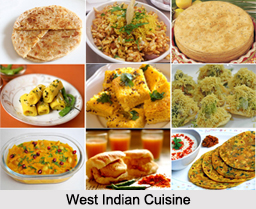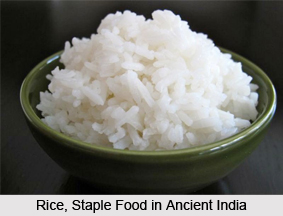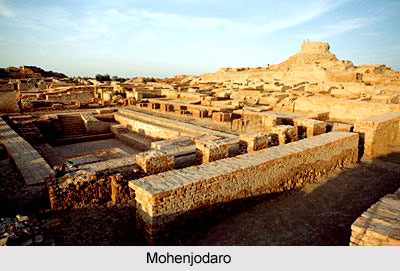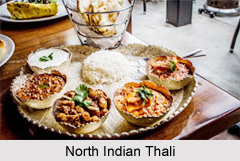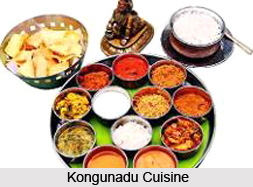 The cuisine is extensive as the Kongu region is vast. Kongunadu is a region comprising the western part of the Tamil Nadu state of India. It includes towns like Ooty, Coimbatore, Pollachi, Tiruppur, Udumalpet, Avinashi, Palladam, Kangayam, Karur, Erode, Aathur, Salem, Palani Mettur and Dharapuram.
The cuisine is extensive as the Kongu region is vast. Kongunadu is a region comprising the western part of the Tamil Nadu state of India. It includes towns like Ooty, Coimbatore, Pollachi, Tiruppur, Udumalpet, Avinashi, Palladam, Kangayam, Karur, Erode, Aathur, Salem, Palani Mettur and Dharapuram.
Features of Kongunadu Cuisine
The cuisine of Kongunadu has their origin and own style. The chefs of Kongunadu follow the traditional way of cooking. It does not involve marination of any raw material thereby giving the food a different taste and unique texture. Roasted groundnut, shallots add different flavours to the dishes. Turmeric is added in grated form and grounded after roasting, that gives the product a deep yellow colour and delectable aroma. The dishes are not very oily and chilli is used minimally. Considerable amount of pulses are also used. Other major specialties of Kongunadu cuisine are the usage of dry coconut, pickles, fried mutton, and chicken. Pickles happen to take an important part in the cuisines of Kongunadu.
Ingredients in Kongunadu Cuisine
Cereals like rye, bajra, jowar are used to prepare delicacies for their main course. The people of Kongunadu prefer the use of unpeeled potatoes and milk in curries. They also favour the usage of "Coparai" which means dry coconut in curries and gravies rather than fresh coconut. In Kongunadu mangoes are heavily used to prepare various sweets. The region is the highest producer in Gingely oil, Coconut oil and Turmeric, which is reflected in their cuisine. Blessed with an abundance of oil seeds growing, the region indulges in a variety of pickles soaked in oil. Lemon, Raw mango, Green pepper, Ginger, etc. are few of those which are made into pickles.
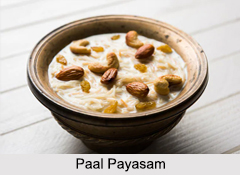 Delicacies of Kongunadu Cuisine
Delicacies of Kongunadu Cuisine
Some of the popular vegetarian recipes of Kongunadu cuisine includes Benian, Mushroom thirattal, Ellu kara dosai, Ragi roti, Pallapatti kathirikai masala, Kathamba saadam, Kuchi kizhangu avail, Salavu kuzhambu, Drumstick leaf adai, Karur kaai kurma, Pachapuli rasam, Nila kuzhambhu, Kollu masiyal, Payiru thirattal, Kaalaan parangi kari. Thandu keema urundai, Karur mutton kuzhambhu, Keeranoor mutton kuzhambhu, Karimeen kuzhambhu, Pallipalayam kozhi varuval, Nathakadaiyur nandu masala, Attakatti yeral masala, and Aathur kozhi kuzhambhu are some of the non-vegetarian dishes.
As coconut grows everywhere in this area it is not surprising it plays a predominant role in all meals. Coconut chutney as side for staples like idli and dosa is almost an everyday affair. Tomato based side dishes like chutney and kuzhambu are also common. One of the most popular breakfast items is the coconut milk based kuzhambu which is called paal curry kuzhambu, usually served with dosa. Paniyaram with coconut chutney, sandhavai (string hoppers) with sweetened coconut milk are other popular breakfast items.
Not as numerous as the coconut, its cousin the Toddy Palm tree also holds a special place. The sap from the cut flower of palm tree is a sweet refreshing drink which is called theluvu (or padaneer) and once fermented becomes toddy. The sugar that is made from this sap is called (karuppati) and is used as a sweetener in cooking and also as a substitute for sugar. It is also much better than white sugar that it is used by people who suffer from diabetes.
Rice is the staple of the Kongunadu people in this area. Before rice became commonly available and everyone switched to eating it, cumbu (pearl millet), (vella cholam) sorghum, ragi (finger millet) were some of the grains that were regularly used. Most of these grains are very good alternative to rice and can be cooked like rice or made into dosa.
A regular Kongu lunch is a wonder in its simplicity. Rice with lentils and an accompanying sour curry made with tamarind or both replaced by a sambhar with a vegetable in season, followed by rasam and finishing off with curd/ yogurt. Generally a stir fried vegetable is also included. The dal is cooked with plenty of water which is extracted for making the rasam.
The lentils most commonly used are toor, moong (whole or split), split hyacinth beans (mocha paruppu) and horse gram. Cow Peas (thatta payar) kuzhambu cooked with a vegetable like brinjal, bottle gourd or white pumpkin is another common recipe. Horsegram, a lentil is common in this area but not as much in other parts of Tamil Nadu.
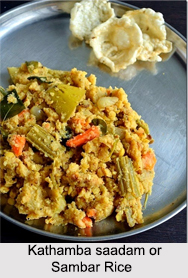 Kara Kuzhambu which literally means spicy curry and one that pairs well with the mostly bland lentils is made with roasted and ground spices and finished off with coconut paste. Tamarind pulp is sometimes added to give it a slightly sour taste.
Kara Kuzhambu which literally means spicy curry and one that pairs well with the mostly bland lentils is made with roasted and ground spices and finished off with coconut paste. Tamarind pulp is sometimes added to give it a slightly sour taste.
Chicken and goat meat based curries, gravies and fries are common meat dishes of the area. Fish is also found in abundance in the ponds and the river. The Kongu way of preparing meat dishes does not include a large amount of spices. It is rustic and is sometimes finished off with coconut paste.
Desserts of Kongunadu Cuisine
Delicious sweets like `Pathaneer Halwa`, `Pathaneer Payasam`, `Elanir Halwa`, `Elanir Payasam`, Vaalai are well known items of this region. Western Kongunadu region has specialties like Santhakai, Oputtu and kola urundai, Thengai Paal, Ulundu Kali, Ragi puttumavu, Arisi Puttumavu, Vazhaipoo Poriyal, Kambu Paniyaram, Ragi Pakoda, Thengai Parpi, Kadalai Urundai, Ellu Urundai, and Pori Urundai.
Milk being abundantly available from the cows and buffaloes that were grown in the farms, lot of milk based sweet dishes common to the area. Payasam with vermicelli or tapioca pearls are other common festival or special occasion sweets. The most common payasam is the paruppu payasam made with moong dal, jaggery or palm sugar and coconut milk. Mysore Pak are coconut burfis are also common sweets. The sweet that is identified as Kongu"s is oputtu that has the covering made of maida or wheat flour over coconut jaggery mixture.
